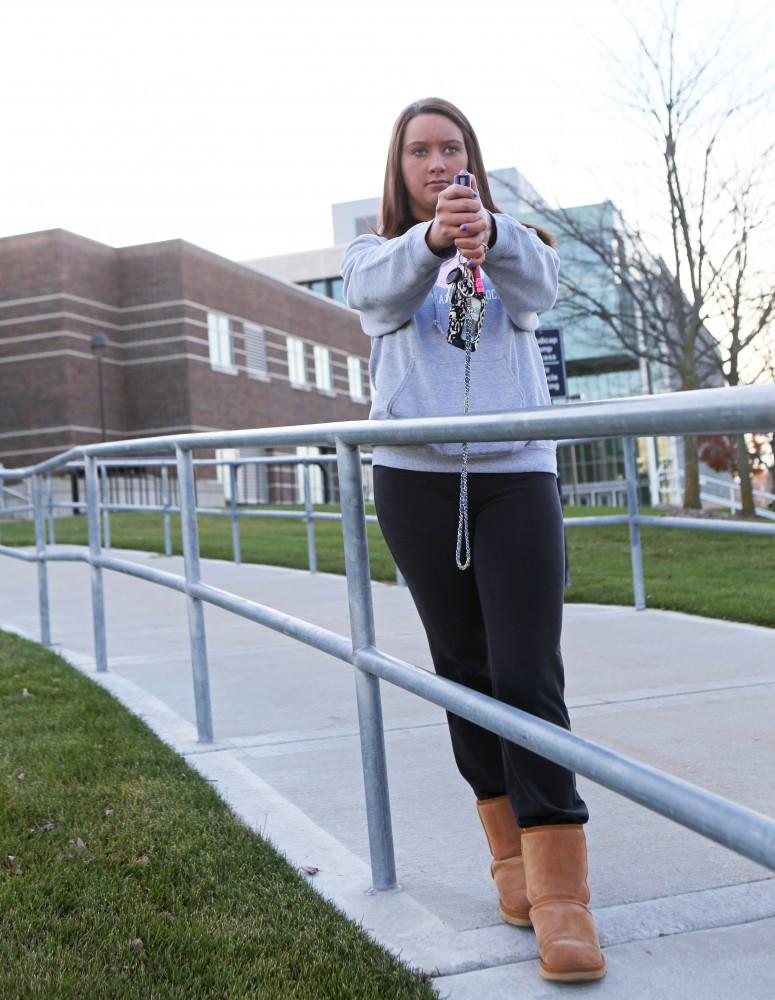GVSU revises rules about pepper spray on campus

GVL/Kevin Sielaff Lauren Davis
Nov 3, 2014
Originally published 11/3/14
Pepper spray will now be permissible at Grand Valley State University due to a change of language in the student code. However the student who inquired into this change does not want to stop there. He is hoping that this will be the beginning step to lifting GVSU’s long-standing gun ban.
GVSU reviewed its student code of conduct this past summer, and in September it was presented to members of the Student Senate.
Benjamin Soltis, a member of the Student Senate Finance Committee, began to look into section 215 of the student code of conduct, “Firearms, Explosives or Weapons.”
“When I looked at the student code it said that it bans anything that operates based on air, spring or gas,” Soltis said. “Technically pepper spray we consider gas.”
Soltis said that he went through University Counsel and worked with Tom Butcher to try to find out why it was banned. Due to Soltis’ inquiry, the language in that section of the student code is now being revised to be inclusive to pepper spray.
Dean of Students Bart Merkle said that the new student code is still being reviewed and he expects it to be done soon. He was unable to disclose the new inclusive language.
Soltis would like to continue to see changes in section 215. He said that he is still concerned that guns are banned on campus.
“Pepper spray is a good step in the right direction, but I think it is not the best way that we should take it,” Soltis said.
Soltis said that every citizen should have the right to carry weapons. He plans on working with county elected officials and like-minded students to make this a reality.
“I am happy pepper spray was unbanned,” Soltis said. “I am very much pushing that guns should be allowed on campus within the state guidelines.”
Dean Merkle has a different take.
“I believe that the university has a right to set its policies to include a no weapons policy,” Merkle said. “I do not believe that opening any campus to people carrying guns, whether it is open carry or concealed carry is a good idea. I see very little that is positive about that.”
Capt. Brandon DeHaan with the Grand Valley Police Department said that law enforcement officers such as campus police officers, Ottawa County sheriffs and federal agencies can carry weapons on campus as long as they are acting within the scope of their employment.
“If there is a student that is possessing a weapon, they may be referred to the Dean of Students office for a violation of student code,” DeHaan said.
Merkle said due to the nature of a university campus, adding guns to the equation would be a negative addition.
“Some of the kinds of issues that we deal with – alcohol and substance abuse, mental health issues and general immaturity and impulsivity and a whole variety of things – this is not a good setting to all of a sudden say anybody who wants to go through whatever process you need for a concealed weapon should be able to carry,” Merkle said.
Merkle is not convinced that if there ever was a crisis situation on campus, that anyone carrying a gun on campus would be able to contribute positively to the situation.
“I think that it creates a brand new challenge for police officers who are trying to address a problem and certainly we don’t want any problems,” Merkle said.
In fact, Merkle is not convinced that pepper spray will be a good addition to campus.
“What police have said to me over the years is that a product like pepper spray, while it occasionally can be useful if needed, that often people who have it either don’t think to use it, don’t have it at hand, or can’t find it, that is not as effective as it sounds like it would be.”
Merkle said this is not because the product is defective, but it is just how people use it and rely on it.
DeHaan said the language is changing in the student code to make pepper spray permissible in the case of self-defense. He said that the reality is that there is always the danger that students could self-harm while using it.
Pepper spray burns the mucus membranes; the eyes, nose, and mouth area, making it difficult to see. Unlike firearms, it’s non-lethal.
“It’s quite a leap to go from a non-lethal tool to go to something that is a lethal weapon,” DeHaan said. “I say that from the standpoint of fact, not of opinion. Pepper spray is a substance as temporary in nature that it may incapacitate someone for some time. Firearms are not. It’s a potentially permanent situation.”

























